This Stocks Bull Market Has Legs, Bargain Prices Mean Buy Now
Stock-Markets / Stocks Bull Market Dec 06, 2010 - 05:47 AM GMTBy: Money_Morning
 Jon D. Markman writes: Stocks swept higher over the past week as investors swooped in to pick up bargains lying on the stock exchange floors. It did not matter if they were in Asia, Europe or the United States. If they were down 10% or more in the past month, they were vacuumed up.
Jon D. Markman writes: Stocks swept higher over the past week as investors swooped in to pick up bargains lying on the stock exchange floors. It did not matter if they were in Asia, Europe or the United States. If they were down 10% or more in the past month, they were vacuumed up.
The Dow Jones Industrial Average rose 2.6% for the week, the Nasdaq Composite went up 2%, the Standard & Poor's 500 Index climbed 3% and the S&P 400 Midcap Index rose 3.2%. Developed markets overseas rose 3.9%, emerging markets jumped 5%, gold increased 3.7%, crude oil rose 6.5% and silver was the star, up 9.4%. The U.S. dollar, which has been driving the bus, fell 1.2%, making the equity gains possible.
Crude futures busted through the $88 per barrel level that has proven to be resistance three times this year. It was fair to expect the resistance to hold again, as there are forces in the Middle East and elsewhere that do not want to allow prices to rise to demand-destroying levels, but traders made it happen.
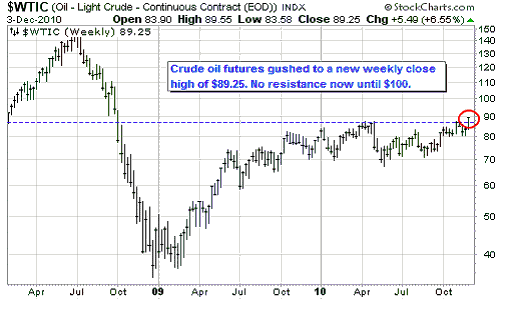
Now there is virtually no resistance until $100, which makes a lot of sense. Crude oil is the only major commodity that is not trading near multi-year highs, and that is because of the concerns that economic growth in developed countries does not support a build-up of inventories. As that point of view changes, the $100 level last seen in October 2008 amid the credit crisis will act as a magnet. And a rapid upward repricing of all stocks in the energy complex will follow.
To get a better feel for whether this might occur, keep an eye on the weather reports. Europe is enduring a massive freeze here in early December. Dozens of major airports on the Continent have closed due to heavy snow, roads are blocked and Eurostar international rail service has been canceled. The unseasonable cold snap has been thought until now to be a fluke, but climates are changing and old views about norms are being challenged.
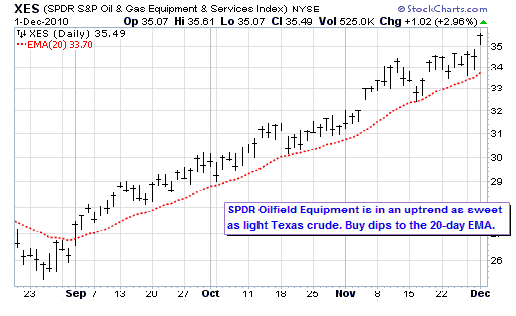
One of the effects of global warming has been a lot of ice in the Arctic released into the northern seas. This is fresh water, so it is diluting the Atlantic Ocean's natural salinity by just enough to matter. Since fresher water freezes at a higher temperature than saltier water, the Atlantic coast of Europe has become much colder than normal -- in some cases by as much as 10 degrees. Then when the wind blows across this colder water, it carries this icier weather onto the landform.
The net effect is a continent that is on track to become persistently cold at a time when oil and gas prices are around the same as they were in balmier times. This must be one of the reasons we see crude oil prices barreling past resistance, and coal prices at their strongest levels in months.
There is an investment opportunity here in all the oil and coal funds, such as SPDR Oil & Gas Equipment & Services (NYSE ETF: XES) and Market Vectors-Coal ETF (NYSE: KOL) as Europeans buy more heating oil, natural gas and coal to stay warm.
Technically Speaking
Breadth in the past week was positive, with advancers beating decliners by 3-1. The number of new highs on Friday was about the same as Wednesday and Thursday at 695, while new lows slipped a bit to 71.
The reason that there were not more new highs: Many of the stocks that performed well during the past month's global swoon treaded water this week. Red-hot stocks like Neflix Inc. (Nasdaq: NFLX), Chipotle Mexican Grill Inc. (NYSE: CMG), F5 Networks Inc. (Nasdaq: FFIV) and even Apple Inc. (Nasdaq: AAPL) were shunned in the rush to grab bludgeoned financials like Bank of America Corp. (NYSE: BAC) and JPMorgan Chase & Co. (NYSE: JPM).
Elsewhere, the key drivers of success this week were better-than-expected manufacturing data, and the fact that the European Central Bank followed through on expectations to extend emergency liquidity facilities into the next year. There was a fear that one of the hosts of the global liquidity party was going to take away the spiked punchbowl, and that was just not a pleasant thought.
Among sectors, the best were financials, materials, energy and retail, while consumer staples pulled up the rear. Treasuries, municipal bonds and corporate bonds were down as investors fled defensive investment for the glories of risk taking. I've been saying that a beta chase was likely into the end of the year, and this is what one looks like.
Looking forward, you might wonder how the market has done historically over the next 30 days when a session in which 90% of stocks rise, as occurred Wednesday, is followed by a day when 80% of stocks rise, as occurred on Thursday. Jason Goepfert of SentimenTrader.com asked his database this question, and it turns out it has occurred 22 times since 1995. And prices rose during the next three weeks 86% of the time, with an average return of +3.9%, which is much higher than the average 30-day return.
This makes sense. When you have a liquidity flood and stocks are considered cheap, interest rates are low, earnings are growing and central banks are not standing in your way, it's an ideal recipe for a strong market. And that's what we have.
As for the health of U.S. stocks overall, it's still fairly good. I checked in with the volume and demand experts at Lowry's Research Corp. for the first time in a while, and here is what they have to say:
-- Buying Power and Selling Pressure. Lowry's primary measures of the forces of supply and demand, the Selling Pressure and Buying Power Indexes, shown in the chart below, display no signs of a major market top. To the contrary, the Nov. 10 high in buying power and Nov. 19 low in selling pressure indicate a healthy pattern of expanding demand and contracting supply. Every major market top since 1933 has been preceded, at some point, by a months-long pattern of rising selling pressure. This pattern is conspicuous by its absence in the current bull market, a point underlined by the recent new low in selling pressure. In addition, the current rally in buying power and decline in selling pressure is consistent with Lowry's Primary Buying Zone, a period that has, historically, carried the lowest risk for new buying.
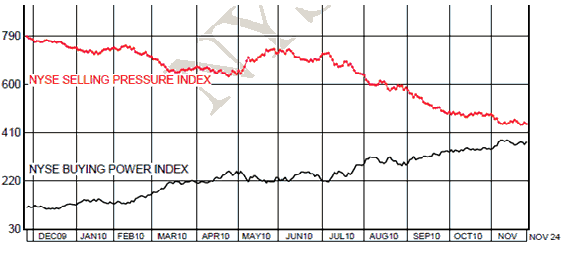
-- Advance-Decline Lines. With only three exceptions since 1929 (in 1946, 1952 and 1976), the NY Adv-Dec Line has begun to weaken, on average, four to six months prior to a major market top. But, as of the recent market high on Nov. 5, the NYSE Adv-Dec Line was also at a new rally high. The same applies to Adv-Dec Lines for the other major indexes, including those for the S&P 500 and S&P Midcap Indexes.
-- New Highs/New Lows. The number of new 52-week highs peaked in April, a level not matched by the most recent peak reading in early November. Historically, a lag in the number of new highs behind a major market top has ranged from a few months to more than a year, so the failure of the latest peak reading to match the April level is, at best, a blunt timing instrument for a major market top. Also, typically in a bull market, there may be many stocks trading within a few percentage points of new 52-week highs. Thus, even a minor rally can produce a sudden surge in the number of new highs. This may be especially true for the current market, given the recently strong relative performances by small and midcap stocks.
-- Volume. Rising demand accompanied by increasing volume has, historically, been the sign of strong rallies, as it indicates buying interest is not only rising, but growing in size. Again, the current pattern is positive, confirming the rally from the August market bottom.
In summary, measures of supply and demand that have provided reliable evidence of past major market tops are providing no rimary uptrend is close to an end. While the market's near term trend remains open to debate, investors are encouraged to keep their focus on the uptrend and to regard any further market pullback as an opportunity for new buying, with emphasis on the strongest stocks in the strongest sectors.
Predicting the Present
Now to make sure we are on the same page going into the final month of the year, let me turn to ISI Group analysts for some help in understanding the primary positives and negatives of the current environment.
Positives:
-- Labor markets are improving, with unemployment claims down, as shown below. A record +48% of CFOs said in a survey last week that they plan to boost employment in 2011, up from 10% last year and -66% the year before.
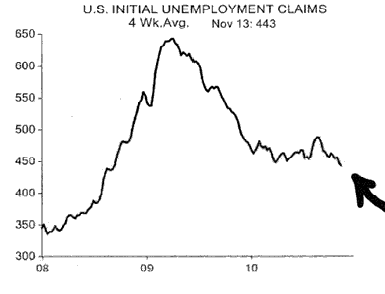
-- Consumer spending was reported up 1.2% and the credit card delinquency rate had declined to a normal level, as shown below. Real consumer spending this quarter is on track to rise 3%.
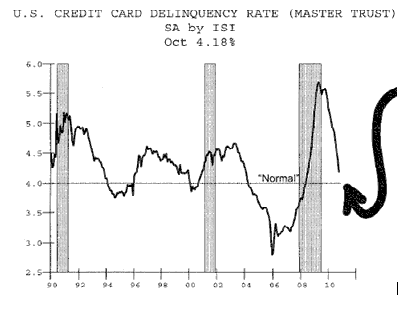
-- Global nominal gross domestic product (GDP) is expanding. The International Monetary Fund estimates that 2012 global GDP at $69.1 trillion, up 52% over 2005.
-- The M2 measure of money supply is up 25% over the past six months. It was up $16 billion last week.
-- The Conference Board's Leading Economic Indicators are up on track to rise 0.5% in November, the third of that size in a row. This suggests Q4 GDP is on track to be up around 3%.
-- Manufacturing was up 0.5% in October and trucking companies are reporting improved results. Moreover Long Beach container exports surged +14.4% month over month and 26.2% year over year, as shown below.
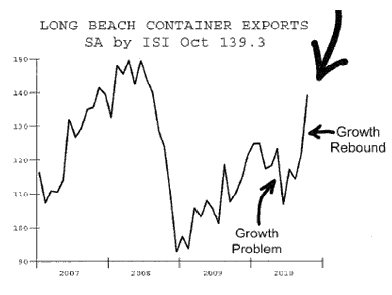
-- Business confidence is rising. General Motors Co. (NYSE: GM) IPO raised more than $24 billion. Caterpillar Inc. (NYSE: CAT) announced an $8.6 billion bid for Bucyrus International Inc. (Nasdaq: BUCY). $41 billion in corporate bonds was sold in the prior two weeks.
Negatives:
-- Housing starts and mortgage applications remain in the doldrums. They are very weak.
-- Retailers' business is probably not quite as good as optimists had hoped.
-- The semiconductor equipment book-to-bill ratio fell back under 1.00.
On balance, except for housing the U.S. economy continues to plod forward. It's not fantastic, but it's not terrible. It's below normal for a recovery, but about normal for mid-cycle.
The bottom line for investors is that it's good enough for the best companies and their shares, while not good enough for everything to go up at once. Stay focused on best of breed and don't try to play the value game.
The Week Ahead
Monday: No reports scheduled. Earnings: Dollar General Corp. (NYSE: DG), The Pep Boys (NYSE: PBY).
Tuesday: Before the bell, ICSC-Goldman Chain Store sales report for the past week. Prior was a 0.5% gain. Also, Redbook Chain Store, prior was +0.6%. U.S. consumer credit for October, prior result was $2.15 billion. API crude oil inventories reported at 4:30 p.m. ABC Consumer Comfort at 5:00 p.m. Earnings: AutoZone Inc. (NYSE: AZO), H&R Block Inc. (NYSE: HRB), The Men's Wearhouse Inc. (NYSE: MW).
Wednesday: MBA Mortgage Purchase Applications at 7:00 a.m., prior was a 1.1% increase. Then Department of Energy crude oil inventories will be reported at 10:30 a.m. Earnings: Costco Wholesale Corp. (NYSE: COST), Diamond Foods Inc. (Nasdaq: DMND).
Thursday: Initial jobless claims will be reported at 8:30 a.m., prior was 436,000. At 10:30 a.m., EIA will report natural gas inventories. Earnings: Esterline Technologies Corp. (NSYE: ESL), John Wiley & Sons Inc. (NYSE: JW.A), Brown-Forman Corp. (NYSE: BF.A), Titan Machinery Inc. (Nasdaq: TITN).
Friday: Before the bell, the U.S. trade balance at 8:30 a.m., the Michigan Consumer Sentiment report, and at 2:00 p.m. the Treasury Budget.
[Editor's Note: Money Morning Contributing Writer Jon D. Markman has a unique view of both the world economy and the global financial markets. With uncertainty the watchword and volatility the norm in today's markets, low-risk/high-profit investments will be tougher than ever to find.
It will take a seasoned guide to uncover those opportunities.
Markman is that guide.
In the face of what's been the toughest market for investors since the Great Depression, it's time to sweep away the uncertainty and eradicate the worry. That's why investors subscribe to Markman's Strategic Advantage newsletter every week: He can see opportunity when other investors are blinded by worry.
Subscribe to Strategic Advantage and hire Markman to be your guide. For more information, please click here.]
Source : http://moneymorning.com/2010/12/05/...
Money Morning/The Money Map Report
©2010 Monument Street Publishing. All Rights Reserved. Protected by copyright laws of the United States and international treaties. Any reproduction, copying, or redistribution (electronic or otherwise, including on the world wide web), of content from this website, in whole or in part, is strictly prohibited without the express written permission of Monument Street Publishing. 105 West Monument Street, Baltimore MD 21201, Email: customerservice@moneymorning.com
Disclaimer: Nothing published by Money Morning should be considered personalized investment advice. Although our employees may answer your general customer service questions, they are not licensed under securities laws to address your particular investment situation. No communication by our employees to you should be deemed as personalized investent advice. We expressly forbid our writers from having a financial interest in any security recommended to our readers. All of our employees and agents must wait 24 hours after on-line publication, or 72 hours after the mailing of printed-only publication prior to following an initial recommendation. Any investments recommended by Money Morning should be made only after consulting with your investment advisor and only after reviewing the prospectus or financial statements of the company.
Money Morning Archive |
© 2005-2022 http://www.MarketOracle.co.uk - The Market Oracle is a FREE Daily Financial Markets Analysis & Forecasting online publication.



